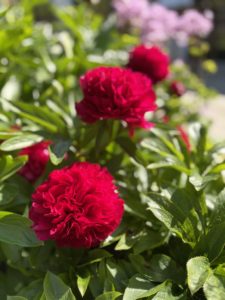
I do not know what specie but in bloom it is quite breathtaking. Tiny pink flowers make the tree look like it is clothed in pink cotton candy from a distance—that might be the sweet tooth in me talking. It looks a bit like the Japanese Sakura, though not as elegant. The loss is quite poignant when not in bloom, seeing the bare branches leaves one reeling as though seeing the queen in rags. And that brings me to my topic, flowers.
From the rain-washed earth, from the rich soil comes nature’s graffiti, colourful, vibrant, and striking. Some chaotic, some calming. From new life to death, from purity or innocence to passion, the language of flowers has played important roles in myths and legends and our everyday lives. In the soundtrack of the 1968 film Romeo and Juliet the lyrics “A rose will bloom; it will then fade. So does a youth, so does the fairest maid,” gives a great analogy. Bulging from a tender bud to full bloom, flowers are associated with youth, beauty, and pleasure. But as they wilt and die, flowers represent fragility and the swift passage from life to death.

Personally, flowers signify peace or the absence of worry as a Christian I am reminded that just as God feeds the birds of the air and clothes the flowers of the fields majestically, he will take care of me, his child. Flowers also remind me a lot of my childhood so it’s time for a story.
There are only two seasons in Ghana, where I grew up; rainy and harmattan. There’s not much of a difference as the sun is scorching hot in both seasons with the occasional rain in the rainy season and incredibly dry humidity in the harmattan. I preferred the rainy season because I found it difficult to breathe while being active in the harmattan, especially on days like this when I got the opportunity to play football. I also enjoyed the smell of petrichor from the numerous fields and lawns in my neighbourhood. The rainy season made Akosombo resplendent, in my opinion. The hot afternoons found various lawns, hedges and trees clothed in a variety of colourful flowers.
According to Ma Evelyn, the lady who lived in the house across mine, Akosombo was one of—if not the most beautiful town in Ghana and I agreed. I hadn’t visited any other cities or towns in the country yet, my grandparents kept calling and asking when I will come to see them, but my father was a busy man and did not have time to take me to see them. He also did not trust others to look after me, something he saw and took seriously as his responsibility. And thus began my endless afternoons or days during school breaks spent at home reading books or solving jigsaw puzzles.
I did not do any of that today though, I smiled as I caressed the spare key I had stolen from my father and carefully put it in my pocket. I had spent my day playing football and roaming around the town with my friends, observing my surrounding with hunger no food could satisfy. I now had to get home before my dad did and as I ran, I felt like Cinderella except my curfew was half past five. I enjoyed the feel of bumpy coal tar, hot due to the sun underneath my flip-flops. Pots of bright caladiums sat on broad steps and exotic-looking bromeliads marked out lawns. A slight breeze caressed my heated skin from a flamboyant tree nearby.
I stopped and prepared to cross the road that run through the neighbourhood before mine. After looking both ways I stepped onto the asphalt. Just as I neared the other sidewalk a car rushed towards me, and I managed to get to the sidewalk before I got hit wincing at the sharp sound of the horn.
Long story short, I managed to get home and shower before my father got back but he still knew of my little adventure around the neighbourhood and my near accident. Due to the extremely efficient Akosombo grapevine, he’d known even before he left his office. I don’t know how I expected to get away with my escapade. Akosombo is a very small town in which anything exciting hardly happened so people killed time by gossiping about each other. I spent half an hour of that evening in my front garden on a time out, making friends with the milk bush plants that made up our hedge as I was asked to face it and ‘reflect’, occasionally responding to conciliatory words from sympathetic neighbours.
Growth, flowers represent that to me on a subconscious level because that evening on meawani street, not only did that 10-year-old girl personally realise that the sap from the milk bush plant itches when it encounters the skin but also that her father really worried about her, though he expressed it in clumsy ways.
